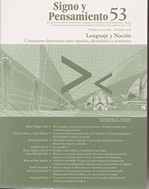Resumen
El artículo presenta una parte del marco teórico de la investigación “Escritura, conocimiento y tecnocultura en la Universidad”, realizada entre los años 2003 y 2004. El estudio tuvo como propósito realizar un diagnóstico sobre las condiciones en que se encontraban los estudiantes de primer año de la Universidad del Valle, en relación con la lectura, la escritura y el uso de dispositivos tecnológicos de comunicación e información. Como parte de la metodología se diseñaron una encuesta y una prueba de lectura y de escritura. Los resultados de esta últimas se analizaron de manera independiente y a partir de un cruce con algunas de las variables de la encuesta. En este artículo se expone una tipología de los discursos, desde la comunicación social, en la que se sustenta la propuesta metodológica, como parte de la fundamentación conceptual para el diseño y análisis de las pruebas aplicadas.Esta revista científica se encuentra registrada bajo la licencia Creative Commons Reconocimiento 4.0 Internacional. Por lo tanto, esta obra se puede reproducir, distribuir y comunicar públicamente en formato digital, siempre que se reconozca el nombre de los autores y a la Pontificia Universidad Javeriana. Se permite citar, adaptar, transformar, autoarchivar, republicar y crear a partir del material, para cualquier finalidad (incluso comercial), siempre que se reconozca adecuadamente la autoría, se proporcione un enlace a la obra original y se indique si se han realizado cambios. La Pontificia Universidad Javeriana no retiene los derechos sobre las obras publicadas y los contenidos son responsabilidad exclusiva de los autores, quienes conservan sus derechos morales, intelectuales, de privacidad y publicidad.
El aval sobre la intervención de la obra (revisión, corrección de estilo, traducción, diagramación) y su posterior divulgación se otorga mediante una licencia de uso y no a través de una cesión de derechos, lo que representa que la revista y la Pontificia Universidad Javeriana se eximen de cualquier responsabilidad que se pueda derivar de una mala práctica ética por parte de los autores. En consecuencia de la protección brindada por la licencia de uso, la revista no se encuentra en la obligación de publicar retractaciones o modificar la información ya publicada, a no ser que la errata surja del proceso de gestión editorial. La publicación de contenidos en esta revista no representa regalías para los contribuyentes.


